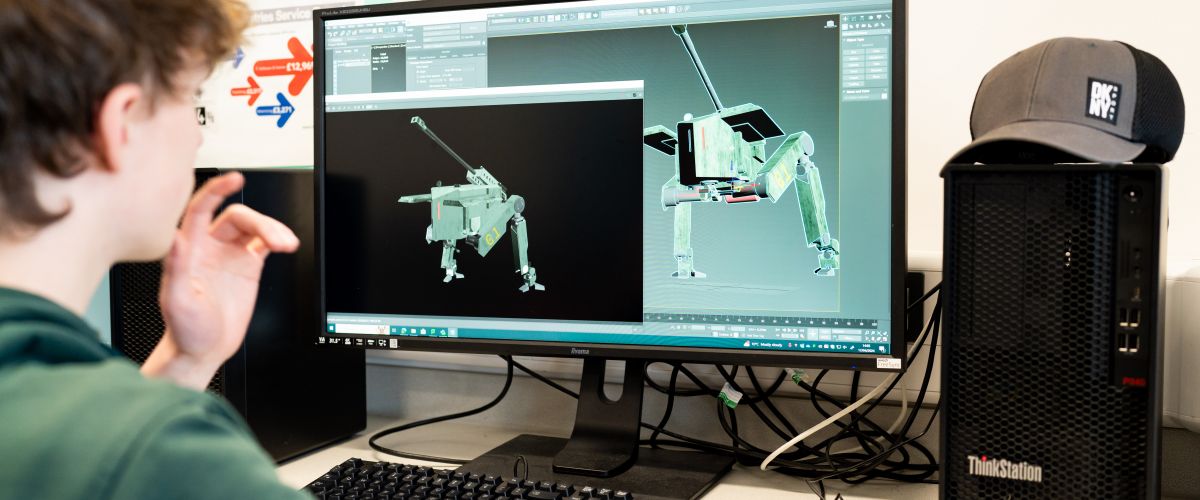UAL Level 3 Extended Diploma in Games Art, Animation & Development
The UAL Level 3 Diploma in Games Art, Animation and Development was developed collaboratively with representatives from universities, Further Education colleges and Sixth Form colleges to ensure that it provides students with the skills, knowledge and understanding they need to progress into Higher Education, Further Education or other training opportunities.
Key information
Media, Photography & Games / Full Time / Level 3 Extended Diploma

Why choose this course?
The diploma will provide you with a Level 3 qualification, which is equivalent to three A Levels. As well as the delivery of relevant and up-to-date course content that has been written by the industry to replicate today's real-world work environment, you will have unprecedented access to industry mentors and industry-designed live briefs, set and assessed by a group of leading companies from the sectors being studied. Over two years, you will build a portfolio relevant to industry needs and as preparation for either working in these sectors or as a progression to Higher Education or Higher Apprenticeships.
The essential feature of this qualification is that the content is being driven by industry. The design of the qualification has been in response to direct input from an industry representative group of employers from across the games art, animation and devlopment industries. The qualification structure has been designed on the principle of a two-year, full-time Diploma (1080 hours) that covers all of these elements: the fundamentals, industry working practice and technical learning about each and all of the games art, animation and development industries. By studying all three areas, you will be able to make the connections between them and acquire transferable skills so that, towards the end of the Diploma, you will be equipped to make a more considered career decision.
Due to the content, the style of deliver and the assessment methodology that underpins this qualification, there are a number of possible progression routes available to you. The inclusion of research, presentation, essay writing and exams as assessment tools will ensure that, if you progress to a degree-level course, you will be well served with the acquisition of study skills that will support you to be able to cope with the independent learning that will be required of you at any Higher Education institute.
A clear understanding of how the games art, animation and development industries work in practice, and the experience of working to a specific industry brief in a way that replicates industry methods of project management, will ensure that students are prepared for their next steps. Whether this is choosing to progress their learning and career path through Games Design at Higher Education or applying these skills to a relevant Degree Apprenticeship, they will be prepared with a strong portfolio and a growing confidence in their abilities as a digital 2D and 3D artist.
What will I learn?
All of the following modules are compulsory and will be taught across the two years.
Fundamental Artistic Skills: Practicing fundamental artistic concepts such as sketching, lighting, colour, composition, perspective and volume, you will understand how traditional processes have been developed and integrated into digital art software systems and processes for games art, animation and development for a range of different purposes.
Fundamentals of Animation: Using industry-standard software, you will be able to design and produce an animation sequence in both 2D and 3D, utilising traditional techniques in the process.
Fundamental Maths and Logic Skills: Gaining an understanding of geometry and proportion will enable you to develop core 3D skills, while understanding numbers and number systems will help you integrate basic mathematical concepts useful for problem solving and simulation in a range of procedural processes. Using probability, statistics and random numbers will all help in the context of creating interactive media products, specifically visual scripting in a game engine.
Story/Playboarding: You will understand the functions and differences between a storyboard and a playboard, understand storytelling concepts, be able to use traditional and digital techniques to produce a story/playboard and be able to present a story/playboard to an audience.
Core Principles of Game Design: Beginning with the core principles of game design, you will understand the significance of games platforms and technologies on the development of game design, understand the significance of age, gender and culture on game design and be able to critically analyse a range of games from a gameplay perspective.
3D Tools: Principles and Practice Grounded by industry pipeline processes, you will understand the basic components of a 3D model, understand the function of textures, know how to use a 3D modelling package effectively, be able to produce 3D models using effective texturing and sculpting techniques and understand the benefit of good workflows and efficient techniques for creating 3D models all using commercial 3D modelling software.
Common Working Practices in the Games Art, Animation and Development Industries: Through applicable research and seminars, you will learn how to communicate and sell a vision, be able to produce a holding vision document, understand job roles, career structures and business models across the games, animation and VFX industries, know how games, animation and VFX businesses raise funds and revenue, understand how products in the games, animation and VFX industries are taken to market, know the regulatory, ethical and legal requirements applicable to the games, animation and VFX industries and be able to work effectively to an Industry Brief.
Art and Design for Imagined Worlds: Using critical research and analysis as a starting point,you will understand the concept of an imagined world in relation to the games, animation and VFX industries, be able to use traditional techniques and digital processes to produce art with accompanying sound for an imagined world concept.
Assessment Arrangements
Your achievement in this subject is dependent upon excellent attendance, punctuality and effort. You will learn in a friendly atmosphere, using a variety of assessment methods: You will review your own performance in 1:1 sessions with your tutor. You will peer review classmates coursework. You will undertake a large project in each industry area. You will create a portfolio of work.
Information & Support
We encourage all students to read widely in the areas of Games Art, Animation and Development. We support independent learning from the start of the course and provide access to recommended video tutorials.
Where will it take me?
After building a clear understanding of art analysis skills and technical problem solving in an array of industry standard software, you can take these skills into a range of creative fields. You can apply these core principles into the films, art, animation, games or architectural visualisation industries. Most of our students progress onto Higher Education but others decide on higher level apprenticeship or freelance work.
What will I need?
You will need four GCSEs at grade 4 including a 4 in English (Lang or Lit.) and or Maths.
Whilst it is possible to re-take GCSE English and Maths at Callywith College, students can only study one of these subjects alongside our Level 3 courses and therefore all students must have at least one grade 4 in English or Maths at the point of enrolment (other course specific entry requirements apply).
Additional Information
Awarding Body:
UAL
To obtain more information about this course, please call: 01208 224000 or email enquiry@callywith.ac.uk

